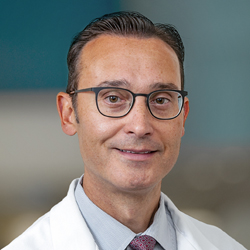Intestinal Rehabilitation Program
The Intestinal Rehabilitation Program at Seattle Children’s uses the latest treatments to help your child’s intestine work well if affected by disease (like short bowel syndrome), injury or a surgery that removed part of it. With recent advances in diet, medicine and surgery, we have greatly reduced the need for intestine organ transplants in children.
Seattle Children’s has the only program in the Pacific Northwest that brings together a team of specialists to restore intestinal function in children who have intestinal failure. Research shows that multidisciplinary teams like ours make a big difference in reducing the health problems these children face.
The program is led by Dr. Evelyn Hsu, renowned liver and intestine specialist. Dr. Patrick Javid is the General Surgery leader in the Intestinal Rehabilitation Clinic.
What is intestinal rehabilitation?
Intestinal rehabilitation is the process of gradually restoring the intestine’s ability to digest food and absorb nutrients. This is done through diet, medicines and surgery other than organ (intestine) transplant.
Who should try intestinal rehabilitation?
Your child may be a good candidate for intestinal rehabilitation if:
- They are on total parenteral nutrition (TPN) because of intestinal failure.
- They were able to stop TPN, but they still have trouble digesting and absorbing nutrients because of intestinal failure.
TPN is a complete form of nutrition given into the blood through a vein (intravenously) by a central line placed in the child’s chest, neck or groin.
A child may be on TPN if they have a complex digestive condition that does not allow them to get all their nutrition by mouth or feeding tube. This includes children with short bowel syndrome, motility disorders, absorptive disorders or other conditions that can cause intestinal failure.
Some children on TPN get part of their nutrition by mouth or feeding tube; some take TPN only.
Why is intestinal rehabilitation used?
TPN is a lifesaver for patients who cannot absorb enough nutrition through their small intestine. But if TPN is used long-term, it can result in liver failure and life-threatening infections.
Our goals with intestinal rehabilitation are to:
- End or reduce the need for TPN.
- Get your child eating by mouth.
- Prevent the need for intestine transplant if possible.
If intestinal rehabilitation does not work or is not an option for your child, intestine transplant may be the next step.
What does the Intestinal Rehabilitation Program do?
Our specialists first look at:
- Your child’s intestinal and liver health.
- Whether your child may be able to switch from TPN to eating by mouth or feeding tube. This can depend on factors like why your child has intestinal failure and how much of their intestine remains if part was removed by surgery.
- Whether surgery options other than an intestine transplant might help.
If we find that your child will benefit from intestinal rehabilitation, your child will take part in an intensive program over several months. The intestinal rehabilitation team will:
- Evaluate your child’s intestinal function in detail.
- Take steps to reduce the risk of central-line infections while your child is on TPN.
- Create an individualized nutrition plan to find the diet that works best for your child’s body.
- Manage overgrowth of bacteria in the intestines.
- Perform nontransplant surgery, such as intestine lengthening or tapering where needed.
- Wean your child from TPN slowly. We decide if and when to wean your child by carefully monitoring many aspects of their health, like whether they are gaining weight and how much stool they pass.
- Teach your child and family about how to care for the central line, how to manage day-to-day nutrition and what to expect.
Depending on your child’s needs, your child may stay in the hospital for the first phase of intestinal rehabilitation. This will be followed by regular clinic visits. We will tailor the schedule to your child.
What happens after intestinal rehabilitation?
Once your child is able to eat by mouth and is off TPN, we will keep seeing them in the Intestinal Rehabilitation Clinic for follow-up visits. Our focus at these clinic visits is to monitor your child’s growth; go over nutrition and feeding plans; and watch for anemia, bacteria growth or other problems that can sometimes happen. Ongoing care from intestinal rehabilitation experts is important to keeping your child healthy.
Who’s on the team?
The Intestinal Rehabilitation Program brings together many specialists to address all aspects of your child’s intestinal health and to provide the support you need to take care of your child at home. The same team sees your child in the hospital and in the clinic, and we are available to you between scheduled visits if you need us.
Team
Gastroenterologists
Intestinal failure registered dieticians
-
Rachel E Kay, RDMS, RDN, CSP, CD, CNSC
-
Erin Elizabeth Walsh, MS, RDN, CD, CSP






